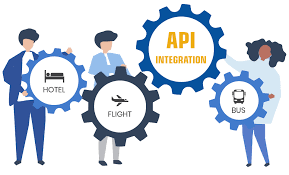Unlocking Seamless Travel Experiences with New API Integration Tools
The travel industry is constantly evolving, driven by technological advancements and the ever-changing needs of travelers. One of the most significant developments in recent years has been the rise of Application Programming Interfaces (APIs), which are revolutionizing how travel businesses operate and interact with customers. These powerful tools allow different software systems to communicate and exchange data seamlessly, leading to more efficient processes and enhanced customer experiences.
Streamlining Booking Processes with API Integration
Imagine a world where booking flights, hotels, and rental cars is a single, unified process. That’s the power of API integration. By connecting various booking platforms and databases, travel companies can offer customers a streamlined booking experience. This eliminates the need for users to navigate multiple websites and fill out repetitive forms, significantly improving convenience and reducing the likelihood of errors. This streamlined approach also boosts conversions by simplifying the booking journey.
Enhancing Customer Personalization Through Data Integration
APIs are not just about simplifying bookings; they’re also crucial for delivering personalized travel experiences. Through data integration, companies can access and analyze customer preferences, past travel history, and even social media activity to offer highly tailored recommendations. This could include suggesting relevant activities, recommending accommodations that match their style, or providing customized travel itineraries. The result? Increased customer satisfaction and loyalty.
Real-Time Data and Dynamic Pricing Opportunities
One of the biggest advantages of API integration is access to real-time data. This is particularly beneficial for dynamic pricing strategies. Airlines and hotels can constantly monitor market demand and competitor pricing to adjust their own prices accordingly. This ensures they remain competitive and maximize revenue. APIs also facilitate real-time updates on flight schedules, availability, and other important information, keeping customers informed and reducing uncertainty.
Improving Operational Efficiency and Reducing Costs
Behind the scenes, API integration dramatically improves operational efficiency. Manual data entry and reconciliation are significantly reduced, freeing up staff to focus on other crucial tasks. Automation of processes like booking confirmations, payment processing, and customer support inquiries saves time and money, leading to a leaner and more profitable operation. This efficiency allows businesses to allocate resources more effectively and focus on growth.
Expanding Reach and Accessing New Markets
APIs also play a vital role in expanding a travel business’s reach. By integrating with global distribution systems (GDS) and other travel platforms, companies can access a much wider audience of potential customers. This opens up opportunities to tap into new markets and increase brand visibility. Furthermore, partnering with complementary businesses through API integration can lead to mutually beneficial collaborations and broaden service offerings.
Enhanced Security Measures in API Integration
With the increasing reliance on APIs, security is paramount. Robust security measures are essential to protect sensitive customer data and prevent unauthorized access. Modern APIs incorporate advanced security protocols, such as encryption and authentication mechanisms, to safeguard information throughout the entire booking and travel management process. Regular security audits and updates are critical to maintaining a high level of data protection.
Future Trends in Travel API Integration
The future of travel API integration is bright. We can expect to see even more sophisticated applications of this technology, such as the integration of artificial intelligence (AI) for personalized recommendations and chatbot-based customer support. Blockchain technology could also revolutionize the way travel bookings are handled, ensuring greater transparency and security. The ongoing development and refinement of APIs will continue to reshape the travel landscape, offering travelers more seamless, personalized, and efficient experiences.
Choosing the Right API Integration Partner
Selecting the right API integration partner is crucial for success. Consider factors such as the partner’s experience, technical capabilities, security protocols, and customer support. A reliable partner can ensure a smooth integration process, minimize disruptions, and provide ongoing support to optimize the system’s performance. Thorough research and due diligence are essential to making an informed decision. Visit here to learn about travel API integration tools.

